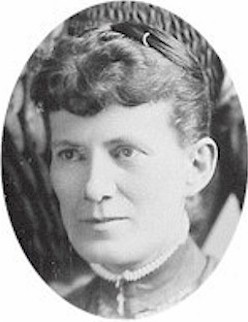
Dr. Marcena Sherman Ricker was a well-known and highly respected physician in her day. She was a graduate of Rochester City Hospital's Training School for Nurses. Born in Castile, New York on July 23, 1852, she began her adult career as a teacher. But after three years, she decided that serving the sick and the less fortunate was her calling. In 1880, she enrolled with City Hospital's first class of student nurses, graduating in 1884. Subsequently, she earned her M. D. degree at the Homeopathic Hospital in Cleveland, received post graduate training in New York City, and returned to Rochester in 1888 to establish a private practice that focused on women's and children's diseases.
She was a member of the Lake Avenue Baptist Church, where she met her husband, Wentworth G. Ricker, a widower with two daughters and the founder of a Rochester manufacturing concern. They were married in June 1893. For the rest of their lives the Rickers would be among the most active lay leaders of their church. In addition, Dr. Ricker's inspiration and leadership led to the creation of the Fairport Baptist Home in 1904.
Although she had graduated from City Hospital's nurse training school, her preparation as a homeopathic physician precluded her practicing there. But rejection by her alma mater may not have been disappointing to the doctor. She was one of the first women to be appointed to the Rochester Homeopathic Hospital (Genesee Hospital).
Like many of her colleagues, Dr. Ricker considered tending the impoverished sick without charge as her moral duty. In 1894 she served as one of the volunteer medical staff members and a charter member of the Board of Managers of the Door of Hope, a home for unwed mothers on Troup Street. The doctor's tenure on the Board and on the medical staff of the Door of Hope lasted until the spring of 1912.
Marcena Ricker, M.D. gained distinction by caring for Susan B. Anthony in her final illness. Although she was not herself a suffragist, the physician had long been a close friend of Miss Anthony and her personal physician. It was Dr. Ricker who was the official spokesperson to the press, reporting daily on the condition of her famous patient during her final illness. And on March 13, 1906, it was Dr. Ricker's description of the suffragist's final hours that the New York Times relied on for its front-page coverage of Miss Anthony's death.
Dr. Ricker undertook many other activities in the service of the aged and disadvantaged, her patients, and her community. Other organizations that benefited from her leadership and active involvement include the YWCA and the WCTU. Dr. Ricker died on January 18, 1933.
By Teresa K. Lehr
